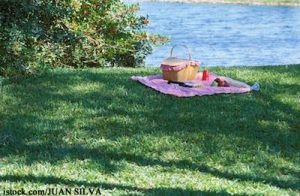As summer approaches, NSF is offering some crucial food safety tips. Summer presents unique challenges to cooks, as higher heat means bacteria grow more quickly, and picnics and cookouts present special risks.
 The number one tip is to start with a clean kitchen. Make sure you know how to clean utensils and appliances. An NSF study found that the germiest places in the kitchen include the refrigerator meat and vegetable compartments, blender gaskets, can openers, rubber spatulas, and the rubber seals on food storage containers.
The number one tip is to start with a clean kitchen. Make sure you know how to clean utensils and appliances. An NSF study found that the germiest places in the kitchen include the refrigerator meat and vegetable compartments, blender gaskets, can openers, rubber spatulas, and the rubber seals on food storage containers.
Always store and defrost foods safely. Never thaw meat or poultry on the counter. Bring perishable foods straight home from the store and refrigerate them promptly. Fruits and vegetables need to be refrigerated too, since pathogenic bacteria can be present on their surfaces. Storing washed and unwashed produce together can cause cross-contamination. And make sure you clean areas where produce is stored.
Keep hot foods hot and cold foods cold. Use a food thermometer to check doneness of foods, especially meat, poultry, fish, and eggs. You can’t safely judge doneness by looking at the food or using a fingertip test. Use ice to keep foods cold and hot plates to keep food hot. And don’t leave perishable foods out of refrigeration longer than two hours even if they are being kept cold or hot; one hour if the air temperature is over 90 degrees F.
Cross-contamination is a big problem in the summer. When grilling, always use a clean platter to hold cooked meats; never place cooked meat on the platter that held the raw food. Use a clean spatula or tongs to remove cooked foods from the grill, and always wash the food thermometer after you test foods for doneness.
Pack and transport perishable foods to picnics and potlucks safely. Place them in the bottom of an insulated cooler and add ice packs. Drinks should be kept in a separate cooler, since that cooler will be opened more frequently, increasing the temperature inside. And transport the cooler in the air conditioned part of the car, not in the hot trunk.
Finally, don’t prepare foods more than one day in advance. It’s best to cook foods thoroughly and consume them immediately.




